According to research, flavonoid-rich foods such as pears, apples, berries, and wine, seem to affect blood pressure levels positively, a connection that’s to some extent due to gut microbiome factors.
The gut microbiome plays an important part in the metabolization of flavonoids for enhancing their cardioprotective effects, and this research offers evidence to suggest these blood pressure-reducing effects are possible with making simple modifications to the daily diet.1✅ JOURNAL REFERENCE
DOI: 10.1161/HYPERTENSIONAHA.121.17441
Flavonoids are compounds naturally found in vegetables, fruits, and plant-based foods which include chocolate, tea, and wine, and have been found in earlier studies to provide various health benefits. The bacteria of the digestive tract, or the gut microbiome, plays an important part in breaking down the flavonoids.
Other research has suggested flavonoids could reduce the risk of heart disease, and this study assessed the gut microbiome’s role in the process. The connection between consuming flavonoid-rich foods with blood pressure and the diversity of the gut microbiome was examined.
The study also looked at how much variance in the gut microbiome might explain the relationship between the consumption of foods rich in flavonoids and blood pressure.
The study was comprised of 904 individuals aged 25 to 82, and 57% of them were male. The individual’s food consumption, and also gut microbiome and blood pressure levels were evaluated with regular clinical and molecular phenotyping follow-up assessments.
Consumption of flavonoid-rich foods in the preceding year was determined from a self-reported questionnaire detailing the quantity and frequency of 112 foods consumed. The value of flavonoids was allocated to foods based on the US Department of Agriculture flavonoid food content data.
The gut microbiome was evaluated by fecal bacteria DNA taken from stool samples. Following an overnight fast, blood pressure level measurements were taken 3 times in 3-minute intervals following an initial rest period of 5 minutes.
Information on lifestyle was also collected from the participants, such as age, sex, physical activity, medication use, smoking status, and also coronary artery disease family history, the amount of fiber daily and calories consumed, and weight and height of each participant were measured to calculate BMI.
The analysis found:
- Individuals with the highest flavonoid-rich food intake, which included pears, apples, berries, and red wine, had lower levels of systolic blood pressure, and also greater gut microbiome diversity in comparison to the individuals with the lowest flavonoid-rich food intake.
- About 15.2% of the flavonoid-rich food and systolic blood pressure association could be due to the gut microbiome diversity.
- Consuming 1.6 one-cup portions of berries daily was related to an average decrease in systolic blood pressure of 4.1 mm Hg, and around 12% of the association was due to gut microbiome factors.
- Drinking 2.8 x 125 ml glasses of red wine weekly was related to a 3.7 mm Hg reduction in systolic blood pressure on average, of which 15% could be due to the gut microbiome.



